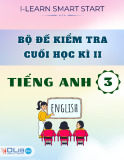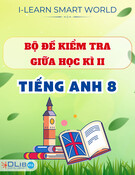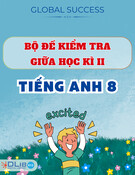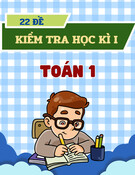Sở GD & ĐT NINH THUẬN TRƯỜNG THPT CHUYÊN LÊ QUÝ ĐÔN
MA TRẬN ĐỀ KIỂM TRA MỘT TIẾT LẦN II ( 2014-2015) Học kỳ I Môn: Tiếng Anh 11 (chương trình thí điểm)
Mục đích của đề kiểm tra: Kiểm tra chuẩn kiến thức trong đơn vị bài học từ Unit 4 đến Unit 5.
Nhận biết
Thông hiểu
Vận dụng
Cộng
Cấp độ thấp
Cấp độ cao
Tên Chủ đề Nội dung kiểm tra: U. 1 – U.3
Gap-filling
Chủ đề 1 Listening
Gap-filling Choose the correct answers
Answer the questions Multiple choice Số câu:2 Số điểm 0.5 Answer the questions Multiple choice Số câu:3 Số điểm 0.75 Số câu:3 Số điểm 0.75
Choose the correct answers Số câu: 2 Số điểm: 0. 5
Số câu: 10 Số điểm: 2.5 Tỉ lệ 25%
Chủ đề 2 Reading Số câu: 10 2.5điểm=25% Số câu: 10 Gap-filling reading Số câu: 2 Số điểm: 0.5 Gap-filling reading Số câu: 3 Số điểm: 0.75 Reading passage Số câu: 3 Số điểm: 0.75 Reading passage Số câu:2 Số điểm:0.5 2.5điểm= 25% Số câu: 10 Số điểm: 2.5 Tỉ lệ: 25 %
Số câu: 3 Số điểm: 0.75
Stress Word definition Word form Word choice Tenses Chủ đề 3 Language
Số câu: 2 Số điểm: 0.5
Số câu: 10 2.5điểm= 25%
Số câu: 10 Số điểm:2.5 Tỉ lệ 25%
Word choice Gerunds State verbs in continuous forms Số câu: 3 Số điểm: 0.75 Simple past and present perfect tenses Prepositions Số câu: 2 Số điểm: 0.5
Chủ đề 4 Writing
Writing about one of the topics given
Writing about one of the topics given
Building sentences using words/ phrases given
Số câu:2 Số điểm 0.5
Số câu: 1 Số điểm: 1.5
Số câu: 1 Số điểm: 1. 5
Số câu: 5 Số điểm: 2.5 Tỉ lệ 25%
Số câu: 5 2.5điểm=25%
Sentence transformati- -on, using verb forms Số câu:2 Số điểm 0.5
SỞ GIÁO DỤC&ĐÀO TẠO NINH THUẬN TRƯỜNG THPT CHUYÊN LÊ QUÝ ĐÔN (Đề kiểm tra có 3 trang) ĐỀ KIỂM TRA SỐ 2 NĂM HỌC: 2014-2015 Môn: Tiếng Anh 11. Chương trình: Thí điểm Thời gian làm bài: 45phút. (Không kể thời gian phát đề)
I. Listening (2.5ms) A. You will hear an English woman called Britta talking to an interviewer about her life in Berlin, the capital of Germany. Listen and choose the correct answers 1. How long has Britta lived in Berlin? A four years B six years C twenty years 2. What does Britta say about living in Berlin? A She can't sleep at night because of the traffic noise. B She misses the museums and theatres in Bonn. C She likes living in a big, busy city. 3. The area of Berlin where Britta lives is A a rather expensive place to live. B a good place to eat out. C a long way from the city centre. 4. How does Britta usually travel around in Berlin? A She walks. B. She uses her bicycle. C. She uses the tram or bus. 5. Britta has lots of friends who A. live near her. B. work with her. C. are still in England. B. You will hear a conversation between a boy, Carl, and a girl, Susanna, about a school concert. Decide if each sentence is correct or incorrect. If it is correct, put a tick in the box for YES. If it is not correct, put a tick in the box for NO.
YES NO
1. Susanna feels shy about playing her violin in public. 2. Carl and Susanna share the same opinion about practising their instruments regularly. 3. Susanna's parents refuse to allow her to give up violin lessons. 4. Carl's aim is to have a career in music. 5. Susanna thinks she would enjoy working in another country.
II. Reading(2.5ms) A. Read the text and choose the correct answer for each question (1.25ms) 'I never expected to spend some of my first year at university filming The Finnegans. I'd only ever acted at school, but I'd loved the book since I was eleven. My grandmother used to say I was just like Polly Finnegan and I always imagined myself playing her.
A
B
Now I've finished both the filming and my first year at university, I plan to spend more time with my family.
I'm going to continue with my studies, but hope to have the opporiunity to d o another TV programme soon.
D
C
I don't know
I enjoyed filming the TV drama but I've missed having a social l.ife what to do at weekends.
Acting is more difficult than I'd expected, but I've learned a lot from other members of my family who work in the business.
I'd taken a year off to go traveling before university. While I was in Chile, my mother emailed me to say there were plans to turn the book into a TV drama. I knew I had to go for the part. She was surprised at first, but sent my photograph to the director and persuaded him to meet me. I flew back and got the part. The outdoor filming started a week into term, so I got permission from the university to be away for three weeks. Once I was back at university, I got up at 6.00 am to write the essays I'd missed. I didn't tell my university friends, but they found out and thought it was great It was an amazing experience - I'm so lucky. After university, I definitely want to make acting my career. I'm not from an acting family, though my grandfather was an opera singer. I've tried for other TV parts but haven't received any offers yet. I don't know how I managed it all, because I had a full social life too. When filming finished, I hardly knew what to do. I've since appeared in two college plays. Unfortunately, I haven't been home much and now my first year at university is over, I'm off to Greece for the summer with friends.' 1. In this text, Caroline Benson is A. advising students to finish studying before taking up acting. B. describing how pleased she was about this opportunity to act. C . warning other young people that acting is a difficult career. D. explaining why she has always wanted to be an actor. 2. Why did Caroline decide to try for a part in The Finnegans? A. She thought the book would make a great TV drama. B. She agreed with her grandmother that she should apply. C . She felt she was perfect for the part of Polly. D. She was anxious about starting university. 3. What does Caroline say about her mother? A. She encouraged Caroline to keep traveling. B. She felt Caroline would be a good actor. C. She was sorry she had emailed Caroline. D. She helped Caroline to get the part. 4. How did Caroline manage to find time to do the filming? A. She missed lectures and hoped nobody would notice. B. She delayed going to university until filming was over. C. She took time off and did her college work later. D. She asked her friends to help with her essays. 5. Which of the following would Caroline write to a penfriend?
B. Read the text and choose a correct word in the box to fill in each blank (1.25ms)
before promotes helps aims originally increasing focus decreasing opportunities support
d. opportunity d. library c. information c. scary b. unforgettable b. barely
c. visual d. hearing b. mobility
b. helpful c. accessible
b. inspiriting d. inspirational
b. discriminate c. discriminating d. discriminated
c. traveling d. to travel b. travels
d. have thought b. are thinking c. thought
b. have been d. are being. c. were
b. about c. with d. in
Formed on August 8th 1967, the Association of Southeast Asian Nations (ASEAN) was (1)………..a group of five countries. Nowadays, ASEAN is a united bloc of ten countries, which ( 2 ) … … . many cultural and sports events besides political and economic cooperation. The ASEAN Para Games for athletes with physical disabilities is a good example. The ASEAN Para Games ( 3 ) … … … at promoting sports for people with disabilities in the region and (4)………public awareness of disabled sports. Regional Para sports events offer ( 5 ) … … . . for building friendship and cooperation among disabled people in ASEAN member states. III. Use of English.(2.5ms) Choose the word whose underlined part is pronounced differently from that of the others (0.5m) 1.a.history 2. rarely Choose the correct answer for each sentence. (2ms) 3.People with……..impairments have difficulty climbing stairs. a. physics 4.We have found ways to make the school building……….to disabled students. a. supportable d. beneficial 5.Watching the events for athletes with disabilities is……….as their achievements are amazing. a. inspirited c. inspiration 6.Educating disabled and non-disabled students in the same school leads to………against people with disabilities. a. discrimination 7. My father’s work involves ……to the member states of ASEAN a. travel 8. We ………..of spending our holiday in Kuala Lumpur, Malaysia now. a. think 9. There ……..about 120 Vietnamese athletes at the 2014 ASEAN Para Games. a. are 10. Being one of the oldest cultures in the region, Vietnam is known……..ancestor worship. a. for IV. Writing: (2.5ms) A. Making sentences from given cues (0.5m) 1.Thailand/ attract / foreign students/ with / its high-quality education/ safety/ very low cost/ living. ……………………………………………………………………………………………………… 2. We / need / change / way / we / think / and act / people in need …………………………………………………………………………….. B. Rewrite the sentences using the words and phrases given (0.5m) 3.In 2011, we received the UNESCO charity award for the third time. have won, three times ………………………………………………………………………….. 4.Our school has used the same curriculum for both talented and challenged students since January. started using, January ……………………………………………………………………………………………………….. C. Writing an article (1.5ms) Write an article of 160-180 words about the following topic: “ Many students with visual impairments in regular schools can’t fully participate in school activities.” Express your ideas about this problem and provide some practical solutions.
SỞ GIÁO DỤC&ĐÀO TẠO NINH THUẬN TRƯỜNG THPT CHUYÊN LÊ QUÝ ĐÔN (Đáp án gồm 3 trang) ĐÁP ÁN ĐỀ KIỂM TRA SỐ 2 NĂM HỌC: 2014-2015 Môn: Tiếng Anh 11. Chương trình: Thí điểm ĐÁP ÁN, BIỂU ĐIỂM, HƯỚNG DẪN CHẤM
I. Listening (2.5ms) A. You will hear an English woman called Britta talking to an interviewer about her life in Berlin, the capital of Germany. Listen and choose the correct answers 1. How long has Britta lived in Berlin? A four years B six years C twenty years 2. What does Britta say about living in Berlin? A She can't sleep at night because of the traffic noise. B She misses the museums and theatres in Bonn. C She likes living in a big, busy city. 3. The area of Berlin where Britta lives is A a rather expensive place to live. B a good place to eat out. C a long way from the city centre. 4. How does Britta usually travel around in Berlin? A She walks. B. She uses her bicycle. C. She uses the tram or bus. 5. Britta has lots of friends who A. live near her. B. work with her. C. are still in England. B. You will hear a conversation between a boy, Carl, and a girl, Susanna, about a school concert. Decide if each sentence is correct or incorrect. If it is correct, put a tick in the box for YES. If it is not correct, put a tick in the box for NO.
YES NO √ √
1. Susanna feels shy about playing her violin in public. 2. Carl and Susanna share the same opinion about practising their instruments regularly. 3. Susanna's parents refuse to allow her to give up violin lessons. √ 4. Carl's aim is to have a career in music. 5. Susanna thinks she would enjoy working in another country. √ √
II. Reading(2.5ms) A. Read the text and choose the correct answer for each question (1.25ms) 'I never expected to spend some of my first year at university filming The Finnegans. I'd only ever acted at school, but I'd loved the book since I was eleven. My grandmother used to say I was just like Polly Finnegan and I always imagined myself playing her. I'd taken a year off to go traveling before university. While I was in Chile, my mother emailed me to say there were plans to turn the book into a TV drama. I knew I had to go for the part. She was
B
I'm going to continue with my studies, but hope to have the opporiunity to d o another TV programme soon.
Now I've finished both the filming and my first year at university, I plan to spend more time with my family.
D
C
I don't know
Acting is more difficult than I'd expected, but I've learned a lot from other members of my family who work in
I enjoyed filming the TV drama but I've missed having a social l.ife what to do at weekends.
the business.
surprised at first, but sent my photograph to the director and persuaded him to meet me. I flew back and got the part. The outdoor filming started a week into term, so I got permission from the university to be away for three weeks. Once I was back at university, I got up at 6.00 am to write the essays I'd missed. I didn't tell my university friends, but they found out and thought it was great It was an amazing experience - I'm so lucky. After university, I definitely want to make acting my career. I'm not from an acting family, though my grandfather was an opera singer. I've tried for other TV parts but haven't received any offers yet. I don't know how I managed it all, because I had a full social life too. When filming finished, I hardly knew what to do. I've since appeared in two college plays. Unfortunately, I haven't been home much and now my first year at university is over, I'm off to Greece for the summer with friends.' 1. In this text, Caroline Benson is A. advising students to finish studying before taking up acting. B. describing how pleased she was about this opportunity to act. C . warning other young people that acting is a difficult career. D. explaining why she has always wanted to be an actor. 2. Why did Caroline decide to try for a part in The Finnegans? A. She thought the book would make a great TV drama. B. She agreed with her grandmother that she should apply. C . She felt she was perfect for the part of Polly. D. She was anxious about starting university. 3. What does Caroline say about her mother? A. She encouraged Caroline to keep traveling. B. She felt Caroline would be a good actor. C. She was sorry she had emailed Caroline. D. She helped Caroline to get the part. 4. How did Caroline manage to find time to do the filming? A. She missed lectures and hoped nobody would notice. B. She delayed going to university until filming was over. C. She took time off and did her college work later. D. She asked her friends to help with her essays. 5. Which of the following would Caroline write to a penfriend? A
B. Read the text and choose a correct word in the box to fill in each blank (1.25ms)
before promotes helps aims originally increasing focus decreasing opportunities support
d. library b. unforgettable b. barely
c. visual d. hearing b. mobility
b. helpful c. accessible
b. inspiriting d. inspirational
b. discriminate c. discriminating d. discriminated
c. traveling d. to travel b. travels
d. have thought b. are thinking c. thought
b. have been d. are being. c. were
b. about c. with d. in
Formed on August 8th 1967, the Association of Southeast Asian Nations (ASEAN) was originally a group of five countries. Nowadays, ASEAN is a united bloc of ten countries, which promotes many cultural and sports events besides political and economic cooperation. The ASEAN Para Games for athletes with physical disabilities is a good example. The ASEAN Para Games aims at promoting sports for people with disabilities in the region and increasing public awareness of disabled sports. Regional Para sports events offer opportunities for building friendship and cooperation among disabled people in ASEAN member states. III. Use of English.(2.5ms) Choose the word whose underlined part is pronounced differently from that of the others (0.5m) c. information d. opportunity 1.a.history 2. rarely c. scary Choose the correct answer for each sentence. (2ms) 3.People with……..impairments have difficulty climbing stairs. a. physics 4.We have found ways to make the school building……….to disabled students. d. beneficial a. supportable 5.Watching the events for athletes with disabilities is……….as their achievements are amazing. a. inspirited c. inspiration 6.Educating disabled and non-disabled students in the same school leads to………against people with disabilities. a. discrimination 7. My father’s work involves ……to the member states of ASEAN a. travel 8. We ………..of spending our holiday in Kuala Lumpur, Malaysia now. a. think 9. There ……..about 120 Vietnamese athletes at the 2014 ASEAN Para Games. a. are 10. Being one of the oldest cultures in the region, Vietnam is known……..ancestor worship. a. for IV. Writing: (2.5ms) A. Making sentences from given cues (0.5m) 1.Thailand/ attract / foreign students/ with / its high-quality education/ safety/ very low cost/ living. Thailand attracts foreign students with its high-quality education, safety, and a very low cost of living. 2. We / need / change / way / we / think / and act / people in need We need to change the way we think about and act towards people in need B. Rewrite the sentences using the words and phrases given (0.5m) 3.In 2011, we received the UNESCO charity award for the third time. have won, three times We have won the UNESCO charity award for three times since 2011. 4.Our school has used the same curriculum for both talented and challenged students since January. started using, January Our school started using the same curriculum for both talented and challenged students in January. C. Writing an article (1.5ms) Write an article of 160-180 words about the following topic: “ Many students with visual impairments in regular schools can’t fully participate in school activities.” Express your ideas about this problem and provide some practical solutions.
The mark given to this part is based on the following scheme: 1. Content: Stating the problem, providing two practical solutions, giving an appropriate conclusion (1 mark) 2. Organization & Presentation: ideas are organized and presented with coherence, style, and clarity appropriate to the level of English language upper-secondary school students.(0,25 mark) 3. Language: a variety of vocabulary and structures appropriate to the level of English language upper- secondary school students. (0,25 mark)












![Đề thi Tiếng Anh có đáp án [kèm lời giải chi tiết]](https://cdn.tailieu.vn/images/document/thumbnail/2025/20250810/duykpmg/135x160/64731754886819.jpg)



